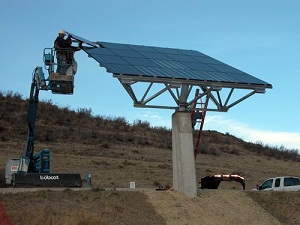Vermont does away with permitting for small solar
 Vermont took one big step toward making solar more affordable last week that many in the state hope will establish it as an example for the rest of the country.
Vermont took one big step toward making solar more affordable last week that many in the state hope will establish it as an example for the rest of the country.
The Vermont legislature approved a solar registration program last week that will allow home and business owners who want to install small solar arrays producing fewer than 5 kilowatts of power to register their arrays as simply as they would register their cars.
The state will then have 10 days to protest the installation.
“The goal really in the industry is to make solar more accessible,” said Andrew Savage, director of communications for AllEarth Renewables, a Vermont-based solar company.
SunRun recently published a study showing that permitting fees increase the cost of solar installations on an average of $0.50 per watt.
The study has been the impetus for some states, including Colorado, to make adjustments to the law that governs permitting fees for small-scale solar installations.
Vermont already had a free permitting system that didn’t add any expense.
“We just want to take the system in Vermont that was already pretty good and make it better,” Savage said.
While Vermont’s solar permits were free, they did cause some delay in projects.
“As with any business, delay equates to dollars,” Savage said.
The new solar registration program will streamline the process and make it easier and faster for home and small business owners who want to go solar.
“We just thought it was time we looked comprehensively at some of those barriers,” Savage said.
There are not normally any safety or health issues involved with small solar installations, and it doesn’t make sense, Savage said, to require people to go through a lengthy, and in many states costly, permitting and application process to do something that ultimately will contribute to the common good. It especially doesn’t make sense, he said, when it takes almost no review and less than an hour to register a giant sports utility vehicle, weighing thousands of pounds, that will be able to drive down the highway at more than 100 miles per hour.
“Of course, we’re hoping the broader impact of this is for other states to look at Vermont as an example of how to effectively decrease the cost of solar,” Savage said.



